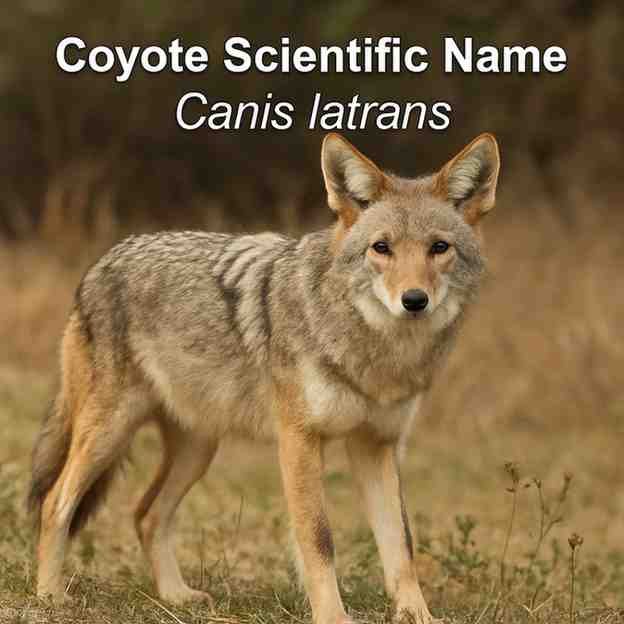What is the scientific name of a coyote? The coyote scientific name is Canis latrans.
Coyotes are intelligent and adaptable wild canines that roam the vast expanse of North America. With a well-developed instinct and a fearsome howl, they have captured the attention of scientists and wildlife enthusiasts for ages. The following description explains the scientific name of the coyote, its complete biological classification, meaning, pronunciation, and more essential facts about it.
This guide adequately covers everything related to the scientific name of a coyote, whether you are a student, a scientist doing their research, or just a curious person.
Table of Contents
What is a Coyote Scientific Name?
The scientific name of the coyote is:
- Canis latrans
This Latin name is used in zoological sciences and biological texts to correctly classify and identify the coyote species. This name follows the rules of binomial nomenclature introduced by Carl Linnaeus.
Coyote Scientific Name Pronunciation (Canis latrans)
The pronunciation of Canis latrans:
KAY-nis LAT-rans
- Canis is Latin for dog.
- The latrans refers to a barking or yelping — a natural epithet for a species distinguished by its unique howls and vocalizations.
Biological Classification of the Coyote
Understand the zoological name of the coyote, which places it within the entire taxonomic hierarchy. Here’s a biological classification:
| Taxonomic Rank | Classification |
|---|---|
| Kingdom | Animalia |
| Phylum | Chordata |
| Class | Mammalia |
| Order | Carnivora |
| Family | Canidae |
| Genus | Canis |
| Species | latrans |
Coyotes belong to the Canidae family, which makes them relatives of wolves, foxes, and domestic dogs.
Where are Coyotes found?
Coyotes are commonly found in the following types of areas in North America.
- Grasslands
- Deserts
- Mountains
- Forests
- Even cities
They have adapted to a very wide variety of different habitats, which has allowed them to populate their range from Canada to Central America.

Meaning of the scientific name coyote
The word Canis latrans means barking dog. This refers to the habit of this creature to howl and call, especially at dawn and dusk.
This genus also includes other species, such as:
- Canis lupus (gray wolf)
- Canis lupus familiaris (domestic dog)
- Canis aureus (golden jackal)
Interesting Facts About Coyotes
| Feature | Detail |
|---|---|
| Common Name | Coyote |
| Scientific Name | Canis latrans |
| Family | Canidae |
| Height | 21–24 inches (at shoulder) |
| Length | 3.3–4.3 feet (including tail) |
| Weight | 20–50 lbs |
| Color | Gray, tan, or reddish with white underparts |
| Speed | Up to 40 mph |
| Diet | Omnivore — eats rodents, fruits, insects |
| Lifespan (Wild) | 6–8 years |
| Lifespan (Captivity) | Up to 14 years |
| Sound | Yips, howls, growls, and barks |
| Social Behavior | Solitary or small packs |
| Habitat Range | North to Central America |
| Conservation Status | Least Concern (IUCN) |
What Sounds Do Coyotes Make?
Among North American mammals, the coyote is the most vocal. Sounds include:
- Yipping: A sound produced by young pups and sometimes while playing.
- Howling: Used for announcing territory and reuniting with other coyotes.
- Barking: Warning or defensive.
- Growling: When offended.
These howls are of such a nature that they carry over very long distances and are often mistaken for wolves.
Coyote Intelligence and Adaptability
Coyotes are extremely intelligent and adaptive. They have managed to exploit living not only in forests and deserts but also in cities. They scavenge, avoid traffic, and, when possible, become more nocturnal to get to safety from humans.
It is one of the most flexible diets, habitats, and behaviors that enables them to be one of the most successful wild animals in North America.
Popular Types of Coyotes
| Coyote Type | Scientific Name | Meaning |
|---|---|---|
| Eastern Coyote | Canis latrans var. (hybrid) | Barking dog |
| Western Coyote | Canis latrans (standard) | Barking dog |
| Mexican Coyote | Canis latrans cagottis | Southern howler |
| Plains Coyote | Canis latrans latrans | Barking barker |
| California Valley Coyote | Canis latrans ochropus | Pale foot |
| Texas Plains Coyote | Canis latrans texensis | Texas native |
| Mountain Coyote | Canis latrans lestes | Wanderer hunter |
| Northern Coyote | Canis latrans var. (regional) | Cold dweller |
| Northeastern Coyote | Canis latrans var. (hybrid) | Mixed canine |
| Southeastern Coyote | Canis latrans var. (regional) | Forest howler |
| Central American Coyote | Canis latrans hondurensis | Honduras barker |
| Tiburon Island Coyote | Canis latrans mearnsi | Mearns’ dog |
| San Pedro Martir Coyote | Canis latrans clepticus | Secretive dog |
| Colima Coyote | Canis latrans goldmani | Goldman’s dog |
| Arizona Coyote | Canis latrans var. (regional) | Desert howler |

